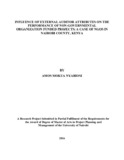| dc.description.abstract | The purpose of this study is to determine the influence of external auditor attributes on the performance of
Non-Governmental Organization funded projects in Nairobi County, Kenya. The study is guided by four
research objectives namely: to assess the influence of external auditors’ professionalism on the performance
of NGO funded projects; to examine the influence of external auditors’ level of education on the
performance of NGO funded projects; to assess the influence of external auditors’ work experience on the
performance of NGO funded projects; and to assess the influence of external auditors’ evidence-based
approach on the performance of NGO funded projects. Relevant literature was reviewed along with the
theoretical authorities around project performance. The study adopted the Theory of Performance and the
Agency Theory. The researcher adopted a descriptive survey design for the research with the target
population being project managers, finance managers, project coordinators, grant managers and internal
auditors of the five selected NGOs within Nairobi County namely: The University of Washington – Global
Assistance Programme (UW-GAP) Kenya, International Training and Education Centre for Health (ITECH)
Kenya, International Livestock Research Institute (ILRI), Tearfund and One Acre Fund. The total
population has 140 respondents. This study used stratified sampling and simple random sampling
techniques respectively whereby the researcher divided the target population into various strata based on
the particular NGO the respondents work in. From each of the strata, the researcher applied simple random
sampling to the homogenous strata in order to obtain representative samples. The sample size was 57. A
questionnaire was used as the data collection instrument. A pilot test was done and the reliability test score
was 0.820975, indicating very high reliability. For data analysis the researcher used IBM’s Statistical
Package for Social Sciences (SPSS) v21. The researcher used simple descriptive statistics whereby the data
was presented in the form of frequency distribution tables and percentages. In order to ensure consistency,
the completed questionnaires were checked for completeness. The data was analyzed and presented in form
of tables and frequencies. From the correlation analysis, it was found that external auditors’ work
experience has a strong positive correlation of 0.547 when evaluated against performance of the NGO
funded projects. The external auditors’ professionalism and their level of education both have moderate
positive correlations of 0.469 and 0.331 respectively against performance of the NGO funded projects.
Their evidence-based approach to auditing has a weak positive correlation of 0.260 against NGO project
performance. The study concluded that there was a significant relationship between the external auditor
attributes and performance of NGO funded projects. The findings concluded that the external auditors’
evidence-based approach to auditing had the least influence on the project performance. It was also
concluded that the external auditors’ work experience had the greatest influence on the project performance.
The study recommended that: project management teams should engage qualified and experienced external
auditors to conduct routine reviews on the programmatic and financial performance of the projects funded
and implemented by NGOs; external auditors should give more emphasis on professionalism, level of
education, relevant work experience and evidence-based approach to auditing as these are key pillars used
in assessing their performance by NGO project teams; external auditors should ensure that client
engagement in form of communication, issue resolution, focus on delivery and credibility of deliverables
are upheld as these form the key indicators or professionalism from NGO project management teams’
perspective; the external auditors should embrace multi-sectorial exposure and experiences which keeps
them abreast with the latest developments and practices; and for avoidance of doubt and protection of
repute, external auditors should always seek to obtain sufficient and appropriate audit evidence to back their
opinions on the performance of projects. | en_US |



